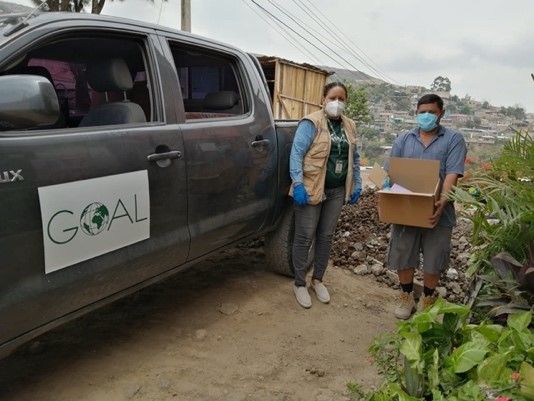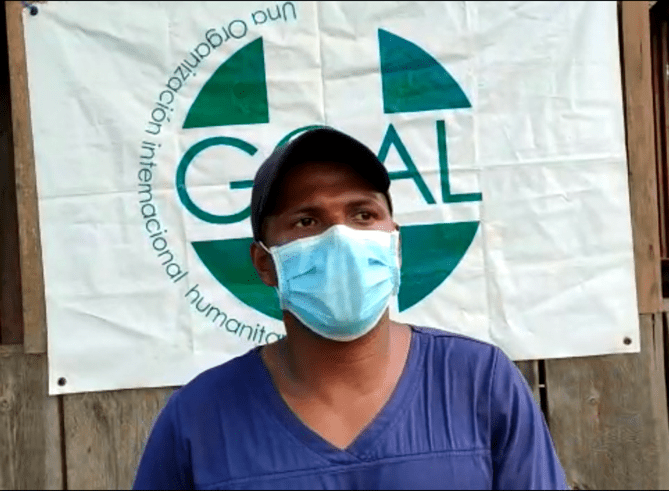 Stories
Stories
May 29, 2020 • 6 min read
As part of our ‘GOAL on the Ground’ series, Kevin Naughton looks at how GOAL is helping vulnerable communities fight the spread of Covid-19 in Honduras.
To date, Honduras has recorded nearly 4,500 confirmed cases of Covid-19 and over 180 deaths. The first case of the virus was confirmed on 20th March. It is believed that the virus was first brought into the country by people returning from Europe. The majority of cases have been located in the departments (regions) of Cortés and Francisco Morazán, the latter of which is home to the capital and largest city Tegucigalpa. Gracias a Dios is the only department to have reported no cases so far.
In response, Honduras has closed maritime, aerial, and land borders; suspended classes at all levels of education nationwide, ordered a nationwide curfew, and price freezes for basic food items and certain medical supplies and equipment.
As the spread of the virus has slowed in Europe, The Americas are now at the epicentre of the global Pandemic.
The Challenges
There is concern around difficulties in carrying out testing; the supply of personal protection equipment (PPE); transparency in managing funds to deal with the crisis and the economic impact on the most disadvantaged.
In this context, the GOAL Honduras team is committed to reaching and supporting the most vulnerable communities to help them during this crisis.
GOAL’s COVID-19 actions in Honduras
Information Campaign
GOAL has been working alongside national and local authorities as well as other NGO’s to contain the spread of COVID-19. With movement restricted and social distancing an integral part of efforts to stop the spread of the virus GOAL has adapted it programmes accordingly. The most effective way for GOAL to help communities is through information campaigns, educating vulnerable communities about the risks of the virus and how to protect themselves from it.

Poster Campaign in La Moskita
GOAL has launched information campaign using radio, social media and loudspeakers on vans and boats, allow us to reach communities without putting them at risk and continuing to encourage social distancing. To date, our prevention messaging has reached over 260,000 people across Honduras.
GOAL was the first humanitarian organisation in Honduras to bring COVID-19 information adapted to the indigenous Miskito people in the remote La Moskitia region. Here health care is more limited and face to face training’s have been necessary due to limits on technology and radio signals. Many of the people in this region are sceptical of the virus as they believe their remote location keeps them protected. This is why educating them of the potential risks is so important.
Distribution of Essential items
The lack of PPE, hygiene items and other essential medical equipment is a problem across Honduras.
GOAL has provided hygiene items and around 1,200 PPE kits containing gloves, masks, alcohol, and sanitizing gel to regional health care units, local emergency committees, water boards, neighbourhood boards, fire services and youth groups funded by USAID/OFDA and Irish Aid funded.

PPE donations in La Moskitia Region
GOAL has provided food to over 50 vulnerable families in need Berlin Neighbourhood Tegucigalpa and to 35 families of disabled divers in La Moskitia Region. In addition, thanks to food company Cargill, 16,200 eggs were distributed to 1,080 in neighbourhoods in Tegucigalpa.
Community Lead Action (CLA)
Despite the limitations of mobility due to curfews, GOAL in Honduras is starting to implement Community-Led Action (CLA), through the already organized Local Emergency Committees (CODEL). This committees were created decades ago, based on the need to increase the resilience of vulnerable populations, save lives, and reduce the impact of disasters on informal settlements in Tegucigalpa, Honduras.
At the moment, GOAL Honduras has concluded the training of 23 CLA Supervisors and 6 CLA mobilizers in action in Villa Nueva Neighbourhood, Tegucigalpa.
Beatriz Sánchez Cárcamo (27), is community mobilizer in Villa Nueva neighbourhood. Both her and her husband have lost their jobs due to the pandemic. They have been struggling get food and pay the rent, but is being supported by the government and donations from GOAL.
She says “GOAL is giving us the opportunity to work helping our communities by sharing with our neighbours how to prevent Covid 19. It is important for everyone to have this information and we are glad to help.”
Santiago Amador., (20) is also a community leader Villa Nueva. He works as a family guide and also is part of his neighbourhood´s CODEL. He feels Covid-19 the worst affect of COvid-19 has bveen it impact on the local economy.
He says “GOAL has supported our community with life-saving knowledge and equipment. The information and PPE material they brought to us today will support our work spreading the word about prevention.”
La Moskita
Located in the department of Gracias a Dios, La Moskitia is a remote, multicultural region home to four different indigenous groups. It is isolated from the rest of Honduras, only being reachable by plane or boat.
To date, Gracios a Dios is the only region not to have any documented cases of Covid-19. There is only one hospital in the region, located in Puerto Lempira and can take hours to reach due to the poor conditions of the roads. With such limited health resources, the most effective actions against Covid-19 is disease prevention and awareness.
Shipping materials and supplies to this region has been a challenge due to the cancellation of commercial and cargo flights to the region due to the pandemic. Fortunately however, thanks to the help of Authorities in Gracias a Dios department, Irish Aid and The Honduran Airforce, we have been able to airlift supplies to the region allowing us to do direct COVID-19 prevention campaigns in remote indigenous communities.
There is only one hospital in the region, located in Puerto Lempira and can take hours to reach due to the poor conditions of the roads. With such limited health resources, the m

Dr. Radley Bendeles, in the Community Health Centre in Suhi, Gracias a Dios.
ost effective actions against Covid-19 is disease prevention and awareness.
Radley Bendeles Vasques, is a doctor based in La Moskitia and runs the Suhí Community Heath Centre.
He says “If the virus arrives, the effects would be devastating, as throughout the region Health facilities and personnel in the region are scarce.”
Through in Irish Aid funded project, our team in la Moskitia, along with the Regional Health Office have visited remote communities such as Suhí, Pranza, Corinto, Raya and Irlaya by car and boats delivering PPE and COVID-19 prevention trainings. This Irish Aid funded programme has reached 66,295 people, equating to 41% of the regions total population. This programme has been completed but our community leaders continue to distribute information material by visiting local families.
Since the start of the outbreak, GOAL Honduras has faced difficulties in procuring PPE and printed materials for its information campaign due to economic and local restrictions in place. Nonetheless, our teams are adapting their programs to these restrictions. GOAL has experience in disease prevention. In 2010 we worked with regional authorities in La Moskitia region to combat Malaria and GOAL was on the front-line in the fight against Ebola in 2014-15. We continue to use this experience and knowledge to help communities combat Covid-19.


